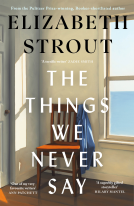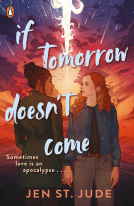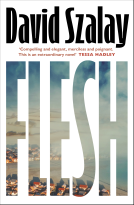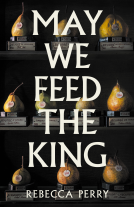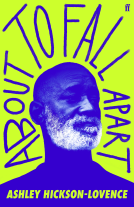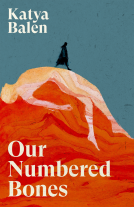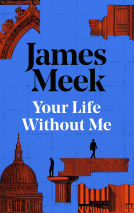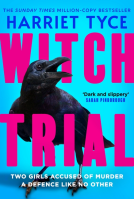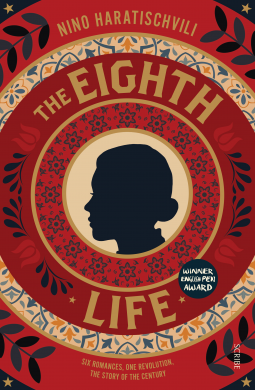
The Eighth Life
(for Brilka) The International Bestseller
by Nino Haratischvili
This title was previously available on NetGalley and is now archived.
Send NetGalley books directly to your Kindle or Kindle app
1
To read on a Kindle or Kindle app, please add kindle@netgalley.com as an approved email address to receive files in your Amazon account. Click here for step-by-step instructions.
2
Also find your Kindle email address within your Amazon account, and enter it here.
Pub Date 1 Oct 2019 | Archive Date 30 Oct 2020
Scribe UK | Scribe
Talking about this book? Use #TheEighthLife #NetGalley. More hashtag tips!
Description
LONGLISTED FOR THE 2020 INTERNATIONAL BOOKER PRIZE
AN OBSERVER BOOK OF THE YEAR
‘That night Stasia took an oath, swearing to learn the recipe by heart and destroy the paper. And when she was lying in her bed again, recalling the taste with all her senses, she was sure that this secret recipe could heal wounds, avert catastrophes, and bring people happiness. But she was wrong.’
At the start of the twentieth century, on the edge of the Russian Empire, a family prospers. It owes its success to a delicious chocolate recipe, passed down the generations with great solemnity and caution. A caution which is justified: this is a recipe for ecstasy that carries a very bitter aftertaste …
Stasia learns it from her Georgian father and takes it north, following her new husband, Simon, to his posting at the centre of the Russian Revolution in St Petersburg. Stasia’s is only the first in a symphony of grand but all too often doomed romances that swirl from sweet to sour in this epic tale of the red century.
Tumbling down the years, and across vast expanses of longing and loss, generation after generation of this compelling family hears echoes and sees reflections. Great characters and greater relationships come and go and come again; the world shakes, and shakes some more, and the reader rejoices to have found at last one of those glorious old books in which you can live and learn, be lost and found, and make indelible new friends.
A Note From the Publisher
Readers of A Gentleman in Moscow will love the setting, while the inter-generational storytelling is perfect for fans of Homegoing.
Advance Praise
‘A harrowing, heartening and utterly engrossing epic novel … astonishing … A subtle and compelling translation by Charlotte Collins and Ruth Martin (on the heels of a Georgian version earlier this year) should make this as great a literary phenomenon in English as it has been in German.’
Maya Jaggi , The Guardian
‘The Eighth Life … is a lavish banquet of family stories that can, for all their sorrows, be devoured with gluttonous delight. Nino Haratischvili’s characters … come to exuberant life. Her huge novel … shows a double face, its crushing pain and loss nonetheless conveyed with an artful storyteller’s sheer joy in her craft.’
Boyd Tonkin , The Financial Times
‘An epic read that will leave you 100% satisfied.’
Stylist
Available Editions
| EDITION | Ebook |
| ISBN | 9781925693072 |
| PRICE | $34.99 (USD) |
| PAGES | 944 |
Average rating from 24 members
Featured Reviews
This is an amiable crowd-pleaser of a novel: a 'sweeping' family saga through the twentieth century history of what purports to be Georgia but which is essentially Soviet Russia. I enjoyed reading it in a light way but am somewhat bemused at what it's doing on the International Booker list: it's entertaining, nicely written, fluently translated - but I wouldn't classify it as 'literary' in that it's not doing anything novel, isn't delivering any new historical or personal insights, doesn't press on the boundaries of genre or language - it's entertaining, it's unchallenging, it's an ideal holiday/bathtub/long flight read. Or one for social distancing or self-isolation in our current times.
One of the limitations of the formal conceit, that this is a long (long!) letter written to a niece, is that the narrator isn't present at most of the scenes and events, many of which take place before she is even born. As a result, this is very 'told' and throughout the 900+ pages, there is minimal dialogue. It's only in the last quarter or so that this starts to change.
It's also the case that, like much popular historical fiction, characters somehow manage to be at all the big events of the age and rub shoulders with the most (in)famous men: if someone's going to have an affair, then it's with a key Soviet leader; if someone is in the army, then they're commanding a unit at the battle of Stalingrad; if someone joins the Navy, then they're manning the 'Road of Life' during the siege of Leningrad ('Kostya had helped get more than 44,000 tons of food and 60,000 tons of kerosene into Leningrad') - no-one is just a farmer or a infantryman, natch!
Some of the history is very simplistic, perhaps even inaccurate? The narrator claims, for instance, that Stalin signs his pact with Hitler because he never imagined that Hitler might renege on it and invade Russia... And there is a tendency for the chapters to end on a cliffhanger of prolepsis: 'but that was where my great-great-grandfather was wrong'.
All of which is making it sound like I didn't enjoy this book: I did - it's just that I expected something challenging and 'literary', and instead got a light family saga with its fair share of melodrama and soapiness. As I said, a page-turning crowd-pleaser.
 Graham F, Reviewer
Graham F, Reviewer
A 900 page history of a chocolate dynasty.
I had heard Wispas about it but it really came to prominence with its International Booker longlisting. It was a Kinder surprise to me the book was so good and it definitely p-p-p-picks up the more you read.
The large red book reminds me of a London Double Decker. Reading it is something of a Marathon, but there is a Bounty of great reading awaiting anyone that reads it. But its no Picnic and I would be Lion if I said it was an easy read, albeit the split into eight books was a Boost. I found I needed to Have a Break at intervals and Work, Rest and Play or my life was consumed with reading it. I also, to avoid disturbing my sleep, made it a rule to never read it After Eight. After finishing I felt I had joined a Club. Reading a few pages a day to my children was just enough to give my kids a treat. I felt I could read it between other books, without spoiling my appetite for fiction.
If you are finding the vast cast list difficult to follow, Yorkie breakthrough may be to draw a family tree as even the small Fry’s in the family are important. At times though the author simply Revels in adding additional cast members. It is a book with more than one Aero which does feel like a Fudge. At times it Mars the reader’s enjoyment.
There is humour in the book – it’s not laugh out loud funny but it did raise some Snickers. The storyline is good although at times it is the crumbliest, flakiest plot I have read.
There is lots of history told as narrative in the book. Some based on events the characters experienced, but some based on rumour or Hershey. Some of the narrative seems unjust - Niza is definitely not a Ferrero. But don’t skip this part, key plot details are Nestle’d among the well known history, even when you think the author is going off Topic. Some books are said to contain a world – this contains a Galaxy.
Overall the book was much darker than I expected – almost like accidentally buying a Bournville.
I have never read any books set in Georgia – but I have read many books from neighbouring countries, some are Turkish – this book was just a Delight.
 Nick B, Reviewer
Nick B, Reviewer
The Eighth Life (for Brilka) is a phenomenal novel – right up there with the best of the best. If it’s not my all-time favourite novel (and it might be) then it must be in the top three or four.
Set over more than a hundred years in Georgia, we follow six generations of the Jashi family. There is the patriarch, a chocolate maker who creates a mystical recipe for hot chocolate that tastes divine but curses those who drink it. Generation after generation, the Jashis partake of the chocolate.
The hundred years span the Great October Socialist Revolution, Stalin’s purges, the Great Patriotic War, the Czech uprisings, Perestroika, Georgian Independence and all the political turmoil in between. Readers with some knowledge of Soviet history will be ticking off the major events one by one. Each turbulent event forms its own story, but the Jashi line continues through the process, impacted by the waves from previous events. And casting a long shadow through the century is the Little Big Man, the Georgian head of the NKVD who is only named in the very last pages of the novel.
The fate of the Jashis seems to be a mirror for the fate of Georgia. Full of promise; starting advantages and natural resources. Then falling into disastrous relationships. Flourishing when playing by others’ rules but falling apart when given the freedom to set its own direction. This is set alongside the fate of the Eristavi family, their lives intertwined with the Jashis, who do not have the Jashi’s connections and do not fit comfortably in the system.
The novel focuses on the lives of seven women in the Jashi line, but each of these seven sections includes backstory; side stories; and continues the story of previous baton-holders. There is enough reference back to remind the reader of previous episodes although, inevitably in a book of nearly 1000 pages and with such an immense sweep of time, some of the references back feel like the ghosts of an ancient time.
The ease with which the story skips back and forth; the asides from the narrator (Niza – herself not born during most of the story she narrates) to the young Brilka in the present day; the leitmotif of the chocolate – it utterly breathtaking. The willingness of the novel to embrace tragedy – stories don’t always have happy endings and villains don’t always get their just deserts – is unusual but refreshingly so. And just as the tragedy brings real and convincing emotion, so too does the love and the laughter that run through the novel.
This is a long novel, but it never feels slow. The stories are told with pace and verve; they are significantly different to one another; the characters are well enough delineated that it never feels repetitive. The length is just because there is a lot of story to tell, and it is told so wonderfully that the effort is in putting the novel down, not picking it up.
Many novels have grand ambitions. They seldom bring it off. But The Eighth Life manages it without breaking sweat. Nothing feels forced, nothing feels flashy. It is just – like the chocolate – sheer perfection.
 Annie S, Librarian
Annie S, Librarian
It feels like a century since I started reading The Eighth Life, by Nino Haratishwili (and translated by Charlotte Collins and Ruth Martin)—but not because it was slow. It felt like a century because its plot spans almost the entire twentieth century, crammed into just under 1,000 pages. In this monumental novel, Niza Jashi recounts the history of her family since the Bolshevik Revolution to the fall of the Soviet Union to her niece, Brilka. Not only do we get a ground view of Soviet history from a country not often seen in English-language fiction (Georgia) but also the troubled history of a family of battling parents and children.
After a brief introduction that puts Niza and Brilka together on a trip across Europe, Niza turns her attention to the 1910s and her great-grandmother, Stasia. Stasia is the privileged daughter of a chocolatier in Tbilisi. She dreams of being a ballet dancer for the Ballets Russes, but infatuation and history get in the way. Stasia marries a White (later Red) Army officer after a whirlwind courtship before the officer heads off to fight. This is the first in a series of couples divided by war. Sadly, no one in the Jashi clan ever seems to find lasting happiness again.
Niza’s tale contains numerous tales of family members who grow apart because of war or allegiance to (or rebellion against) the Soviet regime. Over and over, parents push their children to become their ideal next generation. Sometimes this means coddling them so much that they don’t understand the dangers of speaking their mind. In others, it means taking a child away from one parent to raise them in Moscow. Every attempt at perfection implodes and leaves members of the family bearing irreconcilable grudges against each other. If The Eighth Life had been set in a capitalist country, I think the children of each generation would have run as far and as fast as they could. In fact, the later generations do just this. But because this novel is primarily set in Tbilisi, Georgia, it’s not possible for the Jashis to do anything other than live in close quarters, stewing in resentment.
Charlotte Collins and Ruth Martin beautifully translate this sprawling novel. Haratischwilli’s writing style—which jumps from character to character as Niza shares everything she ever learned about her family—never drags. The plot also never calms down, in part because of history and in part because of intra-family psychological warfare. I’m not sure if I would have been able to read this book in one long session. Deadlines for NetGalley and Edelweiss had me hitting pause on The Eighth Life to read other books. I was always able to pick right back up where I left off, but refreshed from a small break from the Jashis. This might sound like whining; it’s really not. It’s just that there is a lot in the 944 pages of The Eighth Life. Readers should be prepared for a long haul.
I love reading historical fiction and family sagas, so this book was bound to be a fave. It out did my expectations because it covered situations, times and places I haven't read about before and I loved that.
 Pam S, Reviewer
Pam S, Reviewer
An amazing family saga that's so well written that goes over a long period of time. If you like historical fiction and family sagas, this is not one to miss.
thanks a lot to the publisher and NG for this copy.
 Kathleen D, Reviewer
Kathleen D, Reviewer
,And, in tracing the path of this ghost, she hoped to find redemption, and the definitive answer to the yawning emptiness inside her.,
This is the book I have been needing to steep myself in all year. It’s about the revolution of the Janish family, which really begins with a secret, irresistible, seductive hot chocolate recipe that tastes like a blessing but bleeds into their lives like a curse. Surely a cup of warmth that fills the belly with such promise can fix an entire empire and yet how could they possibly know what destructive forces a red century has in store for them all? That they will become knots in a horror story of sorts, isn’t history full of those? Who is ever truly spared the cruelty of wars, within a country or a family? The beautiful Anastasia “Stasia”, ‘who came into the world already dancing’ is oblivious to the power the secret recipe her father (a famous chocolatier) gives her. “He guarded it like a secret of war.” He makes her promise to never allow the recipe to leave the family nor use it lightly, it is meant only for rare, special occasions. Does she heed his warning? From the moment it touches her tongue “it was like a spiritual ecstasy”, her fanciful dreams of life as a ballerina in Paris dissolve, but that is the least of the miseries and sorrows to come. In marrying a friend of her father’s, lieutenant of the White Guard Simon Jashi, she is bound not for Paris but for the cold climate of Russia- a country troubled with unrest. Meant to join her husband who left ahead of her, things run amok and fate teaches her a lesson.
There is no time for innocence nor clumsy dreams. It is only a relative that keeps her alive and later, when everything sours and the October Revolution thunders on, tragedy strikes. Fleeing destruction and death she finds her husband and gets pregnant with their first child ( Brilka’s great grandfather), returns back to Georgia “to the bosom of her family”, only to see the Chocolaterie fall into the state’s hands. Joined together again, she and Simon live in the countryside as a family where her life no longer feels like her own. Her sister Christine comes of age, blossoms and makes a very successful marriage. Stasia’s family grows as she gives birth to a daughter, and refusing to visit her husband in Moscow, instead moves into her father’s halved house. Later, she and her children live with her beautiful sister Christine and her husband Ramas. Christine catches the eye of her husband’s superior, the Little Big Man, awakens his animal urges, and sets in motion a horrific chain of events that will near destroy their entire family.
Then there are the children, Kitty and Kostya and how their lives play out. They both find themselves tied up in Andro’s own future, the son of Stasia’s dangerous friend, Sopio. How did I keep up with every character without notes? That’s how enthralled I was with the family and I began to feel like I was living through it all alongside them. This is a novel rich with history but nothing is more domineering than the fate of these characters. The dust never settles, the devil always seems to be at someone’s heels. But just which devil? There is no monster nor darkness more terrifying than human beings. Betrayal, starvation, treason, infidelity, war, dictators, torture, pogroms… and “Men always want to be in charge of you. What kind of life is that? I may as well have been born a dog; even as a dog I would have more freedom.” It’s not only women who ‘Little big men’ are in charge of, but countries full of doomed people. It’s as if another character may as well have been death, because it’s a constant presence.
If you’re unfamiliar with Russian, German, Georgian history then you will be better informed after reading this novel. I can’t imagine a reader unfamiliar with it being able to understand the choices made nor the traps the characters all fall into. It makes for a more involved investment not all readers are interested in making. I, however, ate these pages. The horror of the times isn’t lost on me, my family has a history rife with Russian occupation and bullets, after-all Russia invaded Hungary. Poverty, hunger, cruelty, war, death, civil unrest- it feels like my own family history. Choosing which side your loyalty lies in a divided country is like choosing your own poison. People talk big who don’t understand living in fear and this novel certainly sheds light on the terror of the powerless.
There is a line about Kitty branded in my head, ‘she was a survival artist’, and the truth is every woman in the Jashi family has to be with their rotten circumstances or curse… “tomato, tamahto”.
I was riveted from the start and urge readers to dig into this novel full of riches. You can’t shake more story out of it. I was exhausted with all the emotional hijacking and I loved every moment of it. I won’t gush in a long winded review, because you need that precious time to invest in this novel. The characters fall into such a deep abyss that it’s a wonder there is a descendant (Brikla, for whom this is all told) that made it through her family’s traumas at all. It’s hard to feel sorry for myself looking back on history. I don’t say this often, but Nino Haratischwili is a hell of a writer. How do her characters occupy her head space, with all their desires, regrets, rage? Yes, read this book! Remember you have been warned, it is not a light read.
Available Now
Scribe
 Alexandra G, Reviewer
Alexandra G, Reviewer
Truly outstanding family saga that spans generations. This is a whopper of a book but it's well worth investing the time in it. I found that once I got into it I really relished spending time in this alternative world that Nino Haratischvili created so expertly. This book is so deserving of all of its recent award nominations, I highly recommend it to anyone looking for an original historical novel which will take them on a journey.
The Eighth Life was longlisted to the Booker International Prize 2020 but missed the shortlist. I would have preferred it to China Iron or The Discomfort of Evening but I think I understand why It did not convince the jury. Too readable maybe?
The long novel is the saga of a Georgian family ( the Eastern Europe one not the US state) starting in 1900 and up to the beginning of the 21st century. The story follows a few generations of dramatic events, either external or among the family.
It took me forever to read this novel, not because I did not like it but because It was too dramatic although the writing is playful and not too oppressive. Many times, the events slide towards melodrama and that was a detail I did not appreciate too much. It seemed that there was no shortage of bad luck for the characters. The writing was pleasant, but I would not say it was anything too special.
There was a magical realism touch to the novel in the form of a secret hot chocolate recipe which brings doom to whoever drinks too much from it. I found this detail useless and a bit out of place.
All in all, I think the novel is worth the effort and it is a great way to learn more about Georgian history and not only. Some people complained that there is too much info about the WW2 but for me it was fine because I am no expert on the subject. I did not even know Beria was Georgian, for example.

